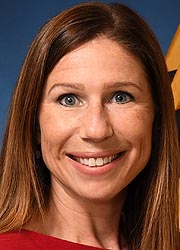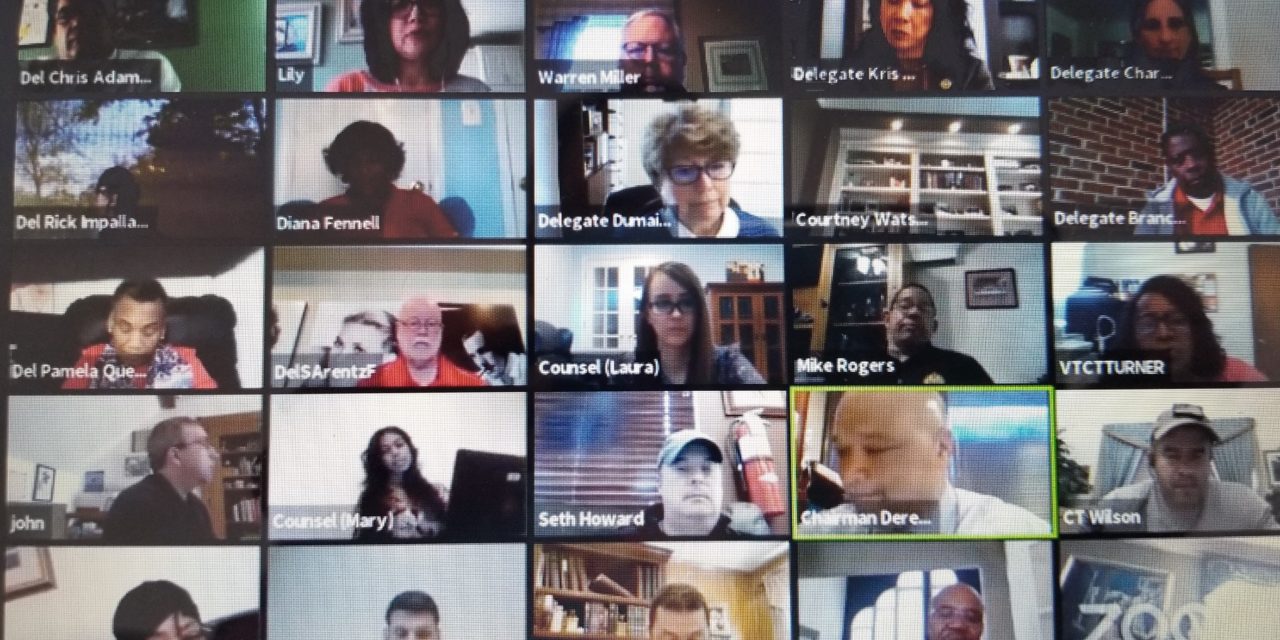Maryland Labor Secretary Tiffany Robinson Defends Her Unemployment Division Amidst Website Chaos
Members of the House Economic Matters Committee held a virtual hearing on Tuesday for an update from Labor Secretary Tiffany Robinson of the unemployment claims filed with her department.
By Regina Holmes
Maryland Labor Secretary Tiffany Robinson said she knows that many Marylanders who have applied — or tried to apply — for unemployment are frustrated.
And she wants to assure you that her employees in the Department of Labor’s Unemployment Division, along with vendors, are working very hard to rectify the most common complaints: delayed payments, busy signals on the phone lines, MIA debit cards, and issues with the BEACON website.
The day after scores of laid-off Marylanders testified via video before two state Senate committees on Tuesday about their difficulties in accessing unemployment benefits, Robinson faced delegates on the House Economic Matters Committee (albeit virtually) to defend her department and address questions the lawmakers might have about the system.
Sounding confident and upbeat, yet apologetic or empathetic when it was appropriate, Robinson used a Powerpoint presentation to outline the challenges the Unemployment Division faces processing the claims of tens of thousands of people who have been furloughed or laid off in Maryland to the coronavirus pandemic.

She emphasized to lawmakers that the sheer volume of the new claims since the pandemic began — a 5,000% increase — has overwhelmed the division, which before the pandemic had been dealing with low unemployment.
“We were at the lowest level in a decade … No one could have expected COVID-19 to hit us like it has, and we began ramping up immediately and we continue to do so,” she said.
In addition, new rules governing the inclusion of workers not previously eligible for benefits — independent contractors, self-employed people, gig workers and sole proprietors — meant that the department had to overhaul its system and procedures to qualify those people for benefits under the federal government’s Pandemic Unemployment Assistance program.
A total of 214,475 claims were paid in all of 2019 — but the division received double that amount in March alone, she said.
A majority of the new claims are from first-time filers, Robinson said.
“Filing unemployment is complex; there are a lot of laws at the federal and state-level governing it. We have waived as many of them as we possibly can, but it continues to be challenging.”
For example, the requirement that claimants must look for work has been suspended until 30 days after the state of emergency ends. The state has been under a stay-at-home order since March 30 and many businesses are required to be closed. Gov. Larry Hogan announced Wednesday that he is lifting the stay-at-home order Friday at 5 p.m. and some businesses will be allowed to reopen at 50% capacity at that time.
Since March 9, Robinson said, the division has been averaging 62,000 new claims per week. Some weeks, as many as 100,000 are handled. Before March 9, the division averaged just 2,000 new claims a week.
She said 109,263 new claims were received last week — setting a record for Maryland.
From March 9-May 2, she said, 494,728 new applications were filed. Of those, 66% have been paid, 27% were “pending adjudication” and 7% were denied.
“When an issue is triggered in a claim, it becomes ‘pending adjudication’ and our team is working around the clock — I can assure you — to resolve every single one of those issues,” Robinson said.
She added that 90% of those claimants were paid within 21 days. The state must pay 87% of its claims within 21 days of the application to comply with federal law, she explained.
The BEACON Blues
Many of the complaints from applicants who testified on Tuesday before the Senate committees were concerning the state’s new BEACON one-stop electronic filing system. The site debuted to great fanfare with the aim of being able to accommodate those applicants who were previously ineligible to receive benefits. BEACON also was supposed to accommodate the massive increase in the number of people filing new claims.
Robinson explained that in 2015 the department had contracted with a vendor, Minnesota-based Sagitec, “to do the full modernization of Maryland’s unemployment insurance system.” The project is 100% federally funded, she said. “The handful of states that have done this have taken many years to do it.”
When she realized how many claims would be filed due to the pandemic and the new, more inclusive criteria, she said the division realized that the Legacy system in place would be inadequate. “We knew it would not be able to handle either the volume or all of the new programs and requirements. It could not be programmed that quickly,” she said. “We decided to add these new programs to the technology that had already been created for us for all Marylanders.”
Although the vendor had assured them that the system was ready, when BEACON launched on the morning of April 24 — chaos ensued. The site quickly crashed and although it was back up within an hour, it crashed a few more times and was very slow because so many people were trying to access it. Robinson said the problems were “serious and disappointing.”
“We had over 200,000 claimants in the system in the first hour that it opened.”
Another challenge has been the U.S. Department of Labor’s issuance of 11 guidance documents to states since April 24 that changed the unemployment rules. Those changes had to be incorporated in the system, and therefore delayed benefits, she said.
Robinson described several ways in which the division is ramping up to handle claims and to improve claimants’ experiences in the process.
- Increasing the staff: Robinson said 150 additional state employees have been assigned to the division and over 100 new employees are in the process of being hired to more than double the total staff. In addition, the state has partnered with vendor Accenture to add 200 unemployment insurance professionals to the claims center. She said that number is being increased to 250-275. “As quickly as they can train additional people and we can get the phone lines available to take them, that exactly what we are going to do. We won’t stop until we have addressed everyone’s issues.”
- Adding phone lines: The agency currently has 200 phone lines and is adding more. “We are working to expand that capacity up to 540,” Robinson said,
- Extended call hours: The call hours have been expanded. The phone lines are open 7 a.m. to 6 p.m. on weekdays and 8 a.m. to noon on Saturdays. Robinson said many people have suggested that the lines should be open 24 hours but she explained why this is not feasible. At 6 p.m, the phones stop taking incoming calls — but the claims agents don’t leave. “It is so unfortunate and it breaks my heart that when that 6 o’clock time frame comes at the end of every day, we have to close the phone lines for new callers coming in — but we definitely do not drop the calls from anyone that is already in the queue and on hold. Claims agents stay two to three hours afterward to handle those remaining calls.
- Improving BEACON: Robinson noted several changes that she said have made the site more efficient and user-friendly. “We created a virtual waiting line” to be transparent …”so people could see the numbers in front of them.” They also created “a gating system,” designating Sunday and Mondays only for claimants filing their weekly certifications — no new applications. The site now limits the number of people accessing it at one time so the pages don’t take too long to load.
“I know that the governor has tried to help me let everyone know that these particular issues with our website are, in fact, fixed,” she said. “We have not needed to use the queue to make people wait in line to do their business on the site in over a week. We still have issues we are trying to resolve and tweak every single day. Some of them are within our control and some of them are not.”
But, undaunted, Robinson insisted that she and her staff will keep plugging away.
“We want to help every single claimant, and we’ll just have to keep working and moving forward until we’re able to do that.”

MarylandReporter.com is a daily news website produced by journalists committed to making state government as open, transparent, accountable and responsive as possible – in deed, not just in promise. We believe the people who pay for this government are entitled to have their money spent in an efficient and effective way, and that they are entitled to keep as much of their hard-earned dollars as they possibly can.

